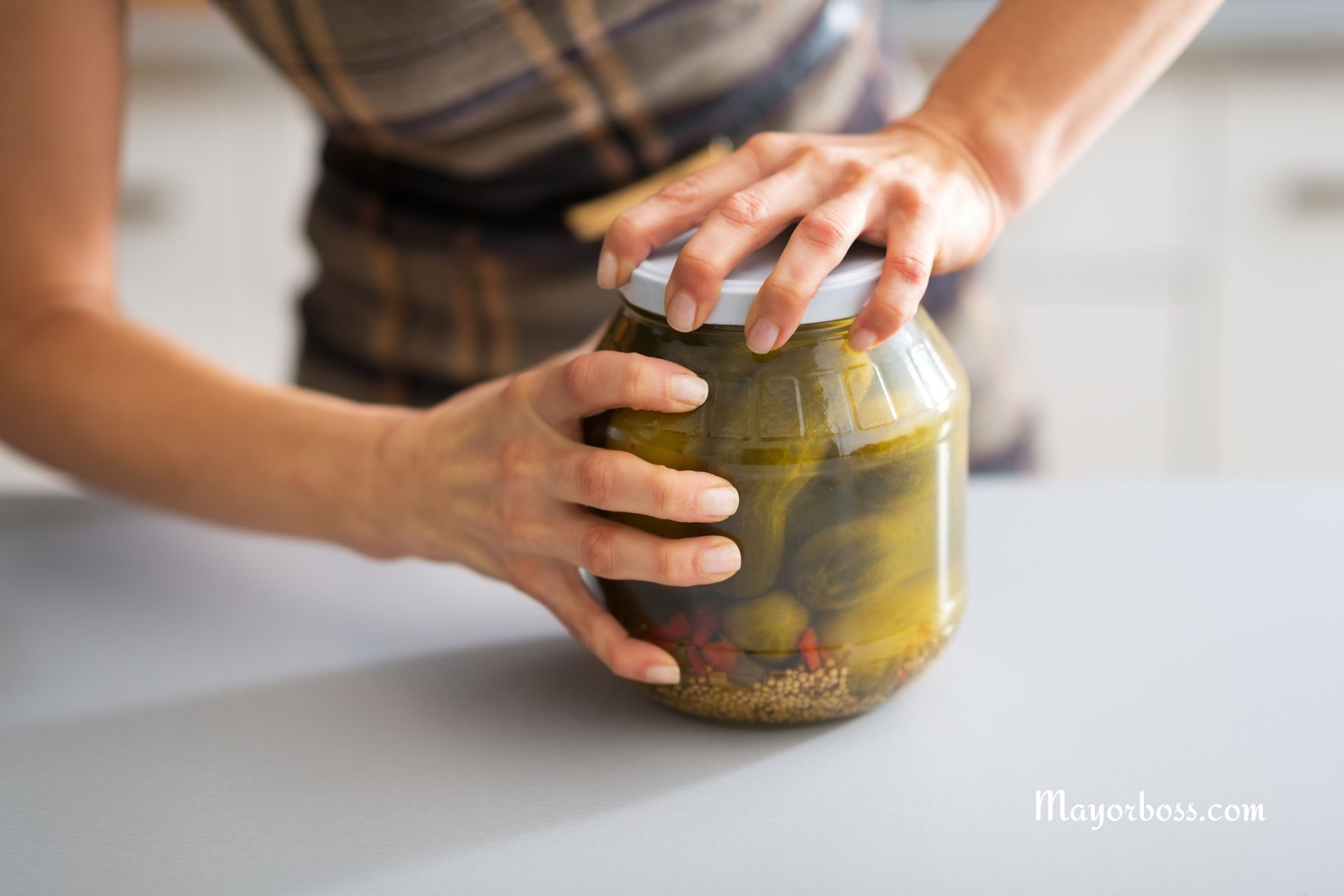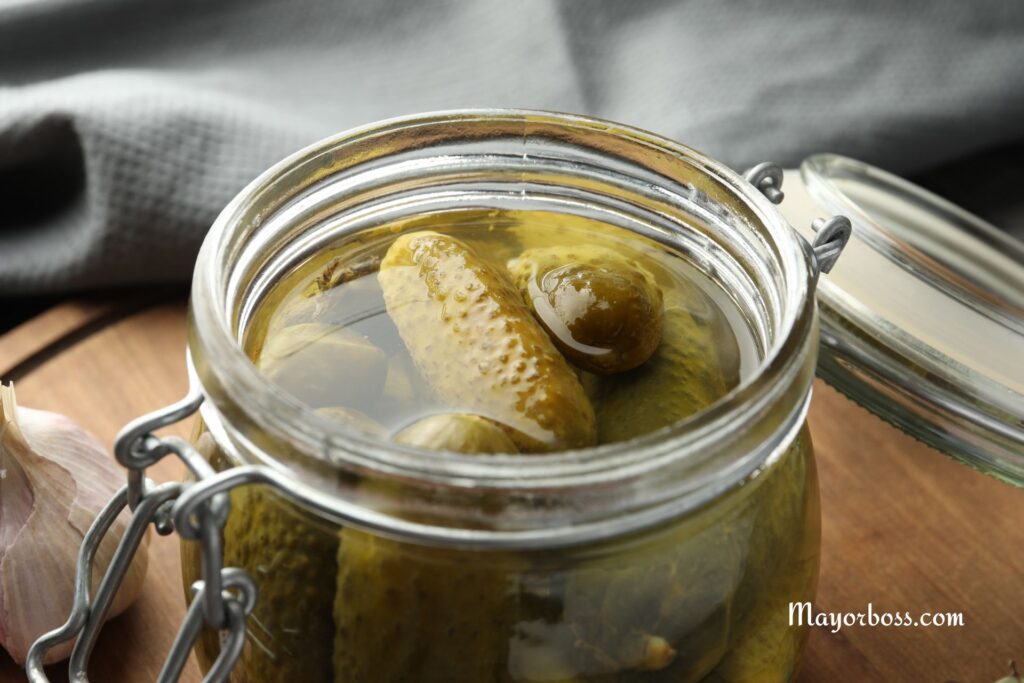Pickle Juice for Period Cramps?! The Surprising Home Remedy You Need to Know
Menstrual cramps are a common discomfort for many individuals. These painful contractions of the uterus, known medically as dysmenorrhea, can interfere with daily life. Over-the-counter pain relievers, heating pads, and rest are among the usual remedies. But some have begun to explore an unexpected option: pickle juice. Its tangy flavor may sound unconventional, but many claim it helps reduce cramping. In this article, we will explore how pickle juice could potentially relieve period cramps.
Keep reading to learn…

Why Do Period Cramps Occur?
Menstrual cramps arise from the contraction of the uterine muscles as the uterus sheds its lining. During menstruation, the body releases hormones called prostaglandins. These hormones trigger uterine contractions, which may cause pain in the lower abdomen, hips, or lower back. The severity of the pain can vary. Some people experience mild discomfort, while others deal with intense cramps that can hinder normal activities.
Why Pickle Juice Might Help With Period Cramps

Pickle juice contains vinegar, salt, and water. It also holds certain electrolytes, like sodium. These components play a role in muscle function and hydration. Muscle cramps in general have been studied in relation to pickle juice consumption, most famously in the context of sports or exercise. Some athletes drink pickle juice to ease muscle spasms. The belief is that the vinegar content interacts with specific nerve receptors in the mouth and throat, which may reduce muscle contraction.
When it comes to period cramps, the same logic might apply. The acidic taste could trigger signals to the nervous system that help diminish muscle spasms. Additionally, the high sodium content can help replenish lost electrolytes, especially if you have been sweating or experiencing changes in appetite or fluid intake. Hydration and proper electrolyte balance are known to support muscle health.
Potential Health Benefits
- Electrolyte Replenishment: Sodium and potassium maintain fluid balance and assist in muscle function.
- Anti-Cramp Effects: Anecdotal accounts suggest that pickle juice calms muscle spasms, which might help soothe menstrual cramps.
- Easy Availability: Many people have a jar of pickles in their refrigerator. Having this home remedy on hand can be convenient.
- Minimal Calories: Pickle juice tends to have fewer calories compared to sweet sports drinks, so it may be a simple and low-calorie beverage option if you are watching your diet.
How to Use Pickle Juice for Menstrual Cramps
If you decide to try pickle juice, consider the following steps:
- Take a Small Amount: You do not need to consume a large volume. A few tablespoons or a small glass may suffice.
- Drink It Cold: Chilled pickle juice might be more palatable and refreshing.
- Dilute if Needed: If you find the flavor too strong, you can mix it with water. Avoid sugary mixers, which might lead to spikes in blood sugar.
- Moderation is Key: Too much pickle juice can lead to excessive sodium intake. If you have high blood pressure or other health concerns, consult your doctor first.
Possible Side Effects and Precautions
While pickle juice may be safe for most people in moderation, it is not without risks:
- High Sodium Content: People with hypertension or kidney issues should be cautious, as sodium can exacerbate these conditions. Consult a healthcare professional if you have a chronic health condition.
- Stomach Irritation: The acidic nature of pickle juice might cause heartburn or other gastrointestinal discomfort in some individuals.
- Interaction with Certain Medications: Those on diuretics or other medications that affect fluid balance should discuss salt intake with their healthcare provider.
Is There Scientific Proof?
At this time, research on pickle juice’s effect on period cramps is limited. Much of the evidence comes from small studies on exercise-induced cramps or from personal testimonials. While these anecdotes can be compelling, larger trials are needed to confirm the benefits of pickle juice for menstrual cramps. As a result, healthcare providers often suggest tested strategies like nonsteroidal anti-inflammatory drugs (NSAIDs), birth control methods, or warm compresses to handle menstrual cramps.
When to See a Doctor
Though trying home remedies such as pickle juice may help, it is important to remember that severe menstrual pain could indicate an underlying issue. If you experience heavy bleeding, intense pain, or symptoms like dizziness or fever, seek medical attention. Conditions such as endometriosis or uterine fibroids can cause chronic or severe pelvic pain and require specialized care.
Takeaway
Pickle juice has gained attention as an unusual yet promising approach to easing muscle cramps, including those associated with menstruation. While many people claim it helps reduce period discomfort, scientific evidence is still growing. Drinking small amounts of pickle juice in moderation is generally safe for most healthy individuals. However, it should not replace professional medical advice or proven treatments. If menstrual cramps severely affect your routine, consult with a healthcare professional for a comprehensive treatment plan. In the meantime, adding a small glass of pickle juice to your list of home remedies may offer modest relief—and at the very least, it is an interesting twist on traditional methods.
